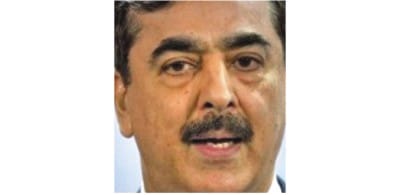Pak govt faces confidence vote

President Asif Ali Zardari's ruling party lobbied coalition partners and Prime Minister appealed for backing from lawmakers yesterday for today's critical vote of confidence as the civilian government faces the most intense pressure from the powerful military since a 1999 coup.
One of Zardari's allies introduced a resolution in parliament which places "full confidence and trust" in the political leadership of the nuclear-armed South Asian state.
In a dramatic and defiant speech, Gilani urged MPs to protect the country's democracy and said he "will not beg support from anyone".
He said that anyone who had a hand in removing his government would be setting back democracy in Pakistan.
"Now we have to decide whether we should have democracy or dictatorship in this country. If we have committed any mistakes, it does not mean that democracy or parliament should be punished," the prime minister told parliamentarians.
The National Assembly will debate the confidence motion on Monday and the government hopes for a vote next week.
The vote comes amid a deepening political crisis between the government, the military and judiciary. It will be held as a Supreme Court deadline expires for the government to reopen political corruption cases.
The deadline was set after the court quashed a government amnesty for politicians, including Pakistan's President Asif Ali Zardari, and is seen as a direct challenge to the government.
Analysts predict that Gilani is likely to win the vote of confidence, and that obtaining parliament's seal of approval is likely to strengthen his hand.
Meanwhile Pakistan's President Asif Ali Zardari returned to Pakistan yesterday after a brief visit to Dubai.
His departure on Thursday fuelled rumours of an impending military coup, in a country which has a history of army takeovers.
Pakistan has been under military dictatorships for about half its history since independence in 1947, its civilian leaders thrown out in three coups.
But despite current tensions, analysts say another coup is unlikely and early elections, possibly in the first half of this year, are a more plausible outcome.
The government's stand-off with the military escalated earlier this week when the military publicly rebuked Gilani on Wednesday, warning of "serious ramifications with potentially grievous consequences" after he criticised military leaders in a media interview.
Gilani also sacked his defence secretary, who is seen as having close ties to the military, in a move likely to heighten frictions with military leaders.
But in a move seen by analysts as an attempt to ease tensions, Gilani called a meeting of the cabinet's defence committee for today.
This will be the first time civilian and military officials will meet face-to-face since the latest crisis erupted. They are likely to discuss last year's Nato attack on a Pakistani border post.
Last month Gilani said conspirators were plotting to bring down his government, without specifically blaming the military. That prompted the army chief Gen Ashfaq Kayani to dismiss coup rumours.
At the heart of the rift is an anonymous memo which sought US help to avert a possible military coup in Pakistan following the killing by US forces of al-Qaeda leader Osama Bin Laden in May last year.
Meanwhile adding to the pressure, opposition leaders under former premier Nawaz Sharif later met and called for general elections to be held under an interim administration as soon as possible over the government's refusal to listen to the courts, Pakistan Muslim League-N party spokesman Ahsan Iqbal said.

 For all latest news, follow The Daily Star's Google News channel.
For all latest news, follow The Daily Star's Google News channel. 



Comments